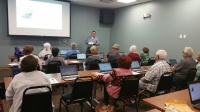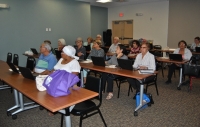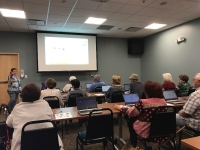Basic Computer and Internet Program for Seniors
Miami-Dade Public Library System, Fla.
Innovation Synopsis
Miami-Dade Public Library System partnered with Preferred Care Partners, a Medicare-contracted health plan, to provide adult lifelong learning computer classes for senior citizens. Library and Preferred Care Partner staff developed an innovative basic computer and internet program to teach seniors basic technology skills in a setting frequented by and convenient for them.
Challenge/Opportunity
According to AARP, 65 percent of people past the age of 75 don’t have computers. Those between the ages of 60 and 70 are proportionally using fewer computers. A substantial portion of seniors in the program lack access to the internet, do not know how to use a computer and/or simply cannot afford an internet subscription. Research shows that seniors who readily adapt to technology benefit from and improve their health and social quality of life.
Key Elements of Innovation
The basic computer and internet program offered by MDPLS to Preferred Care Partner members was specifically structured to teach older adults. In order to bridge the “digital gap,” one of the instrumental parts of the program was to provide the equipment and essentially merge the experience into their daily routine. Classes were task-oriented and involved highly interactive methods to teach basic knowledge of computers and internet. Instructional methods included lecture, modeling and active participation.
Achieved Outcomes
Since its inception in February 2017, approximately 300 seniors have participated in the program. Those who have completed the course expressed having a more positive and confident attitude towards the use of computers and accessing the internet. Eighty-two percent of the participants expressed an interest in trying new technology and participating in additional advanced classes. Additionally, 90 percent expressed feeling more socially engaged and felt the program provided a great springboard for additional peer-to-peer activities.



